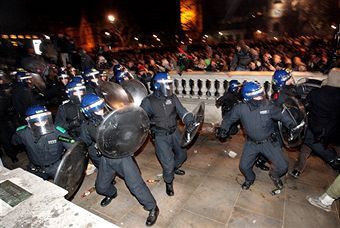 A month ago I found myself in the space of one week in two different countries, yet in
the midsts of what felt like the same phenomenon: the political awakening of a new generation. In both London and Rome, students took to the streets to protest against government policies in
numbers and in ways that those who graduated just a few years before would have found anachronistic, odd even.
A month ago I found myself in the space of one week in two different countries, yet in
the midsts of what felt like the same phenomenon: the political awakening of a new generation. In both London and Rome, students took to the streets to protest against government policies in
numbers and in ways that those who graduated just a few years before would have found anachronistic, odd even.
Unsurprisingly, given the historical, political and even emotional differences between Britain and Italy, there were differences between the protests. But as I walked the packed streets, listened to the protests, read their slogans, I heard similar arguments – particularly about the lack of fairness. When both events were finished, Whitehall and Via del Corso looked similarly destroyed.
Were there things, I wondered, that tied the London and Rome protests together – besides the thrill of anti-Establishment violence. “The cuts,” an old-timer told me in London, as we watched the students. “They’ve awakened a new generation.” Perhaps – but in Italy the cuts are skin-deep while the nature of Silvio Berlusconi’s government inspires more hatred than David Cameron could ever generate.
Yet the old-timer had a point. The cuts did unify the students, gave them a common language. For the cuts struck at what the protesters feel entitled to. This generation of students have a greater sense of entitlement than any that has come before them. They grew up with 500 channel TVs, cheap short-haul flights and inexpensive clothes. They never really had to work for it, it was always there, and they never really knew it could end. Theirs is a sense of entitlement born of a combination of affluence and ignorance – ignorance of how hard it was to create the modern-day welfare state and how close we still live, will always live, to the precipice.
Now that the music has stopped, the students are unwilling to accept that there will be fewer chairs, that seating is no longer free and that everyone cannot, indeed should not, come along for the proverbial ride. With their political backers – some starry-eyed 68’ers like John Pilger, others opportunists like Ed Miliband, the students deny reality – the cuts, they say, are not necessary or go too far.
But beyond the indulgence of the JCR, the world has stopped functioning as it has for the last 20 years. More people will have to work harder, longer and for less – not necessarily for less salary, but for less public services, less pension and, if inflation sets in, less purchasing power. In other words, for fewer entitlements, including in the educational sector. That is the world the students are united against, a world without their entitlements.






Comments